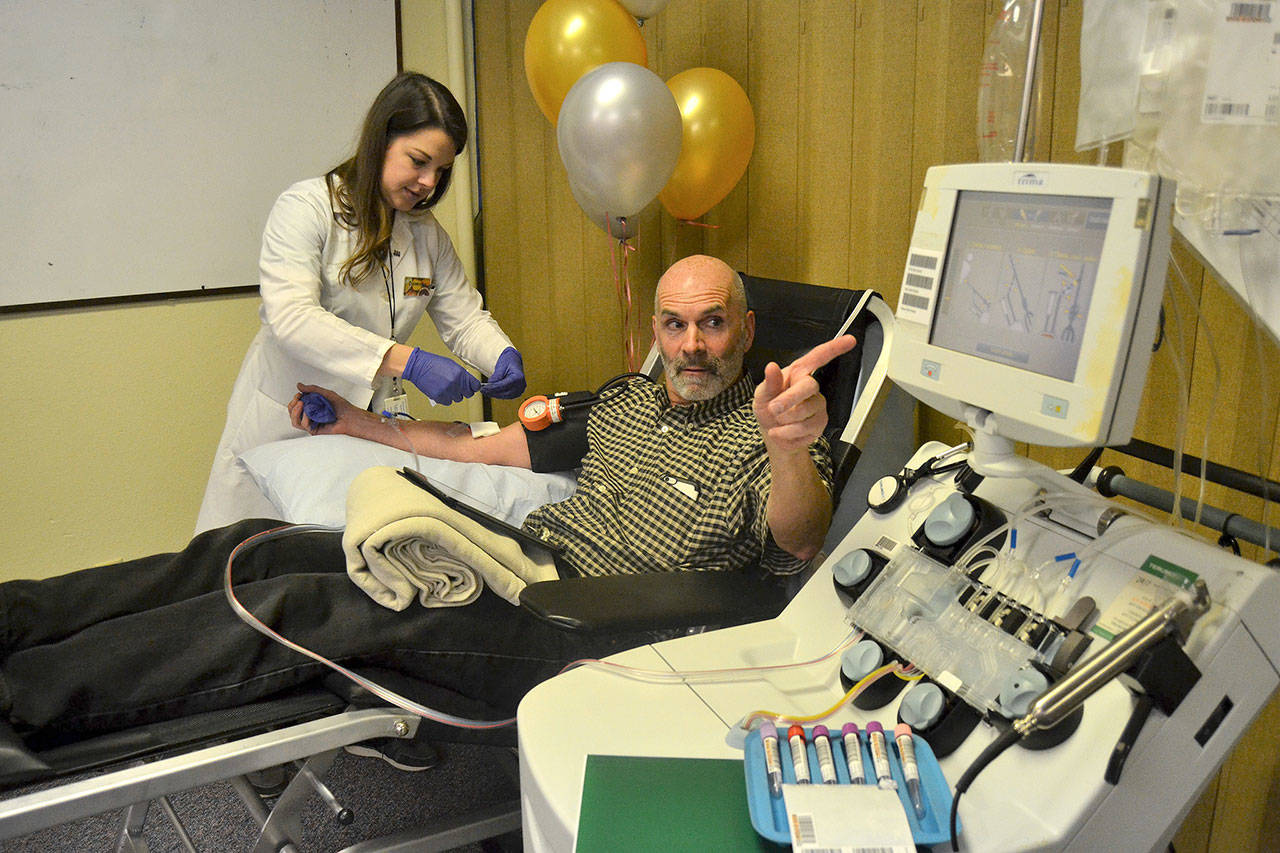SEQUIM — Doug Brundage, 62, recently hit the centennial mark for giving.
He gave his 100th pint of blood through Bloodworks Northwest at a mobile center inside First Baptist Church of Sequim earlier this month.
“I’ve always done it out of principle,” Brundage said. “It’s an important thing to do.”
Brundage remembers first donating back in college at Western Washington University in Bellingham in 1977, but the urge to continue donating began in 1986 when a coworker was diagnosed with leukemia.
Fellow staffers Hal Woods and Don Denny organized the blood drive in the coworker’s honor, Brundage said, and the tradition continued at their work, the Washington School Information Processing Cooperative.
Brundage never stopped either, even after retiring seven years ago.
He remembers one of his coworkers, Patti Skomesa, had at the time nine or 10 gallons donated by the time the blood drive started.
“I thought it was an honorable thing to do,” Brundage said.
In Sequim, he schedules himself online through Bloodworks when he’s eligible to give, or about every two months.
“I just think of it like a pinch,” Brundage said of the needle. “It’s not that big of a deal.”
He typically brings a movie to watch on his iPad.
Brundage also is one of the rarer donors in the U.S. with AB-positive blood type that makes up about 2.5 percent of the population. If needed, he could receive blood from anyone.
One of the highlights of his giving was learning that his blood went once to research at the Fred Hutchinson Cancer Research Center.
Bloodworks Northwest’s website states that it supplies blood to more than 90 hospitals in the Pacific Northwest.
For Brundage’s 100th pint Nov. 8, coworker Gigi Marunde from Sequim Community Church, surprised him with balloons and a sign.
Donors like Brundage and Marunde aren’t paid for blood donations from Bloodworks Northwest, formerly known as Puget Sound Blood Center, a nonprofit.
In Washington state, people 18 and older can donate, and minors of ages 16 and 17 can donate with permission from a parent or guardian.
How frequent you can donate depends on the type of donation, such as a whole blood donations every 56 days or plasma every 28 days, or up to 13 times a year.
Also, depending on the type of donation, it can take less than an hour (whole blood donation) or up to 120 minutes for other types. About one pint is taken for each donation.
On the North Olympic Peninsula, the next scheduled donation sites include:
• Friday Sequim Safeway, 680 W. Washington St., from 9 a.m. to 3 p.m., closed for lunch between 11 a.m. and noon; and Jefferson Healthcare, Direksen Conference Room, 834 Sheridan, from 9 a.m. to 3 p.m., closed for lunch from 11 a.m. to noon.
• Tuesday, Clallam County Public Utility District office, 104 Hooker Road, from 9 a.m. to 3 p.m., closed for lunch between 11 a.m. and noon.
For more information, visit bloodworksnw.org, or contact clinicalprogram@bloodworksnw.org or 1-800-366-2831.
________
Matthew Nash is a reporter with the Olympic Peninsula News Group, which is composed of Sound Publishing newspapers Peninsula Daily News, Sequim Gazette and Forks Forum. Reach him at mnash@sequimgazette.com.

